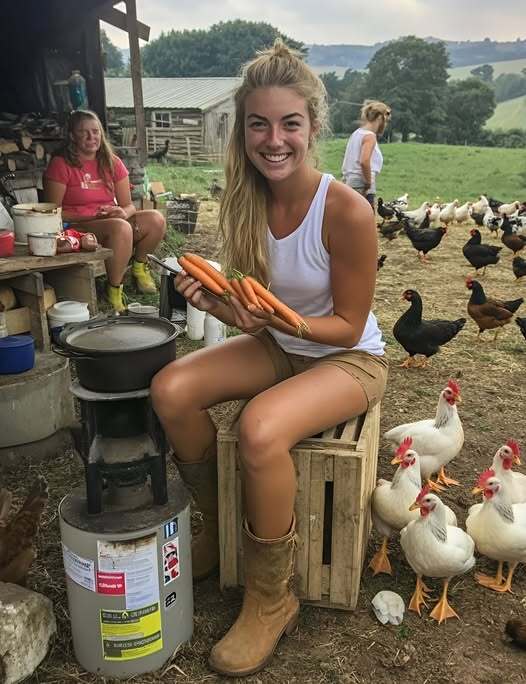I grew up on a sweet potato farm about ten miles outside the nearest town, where mornings began long before sunrise and vacations meant the county fair. Life was simple, sometimes grueling, but always grounded in family, soil, and sweat. My parents carried their work in their bodies—calloused hands, dirt forever etched beneath their nails, and resilience shining in every step they took. For the longest time, I believed that kind of hard work automatically earned respect. But leaving the farm taught me a different, more complicated lesson.
When I was awarded a scholarship to attend a prestigious private high school in the city, it felt like stepping into a dream. My parents were proud, my community celebrated, and I carried the weight of everyone’s hopes on my shoulders. Yet, the moment I walked into that new school, I discovered that the world outside didn’t always see value in muddy boots or homegrown roots.
First Day in the City
That first morning, I entered homeroom wearing jeans that still held the faintest scent of the barn. I hadn’t noticed it until a girl with a perfectly polished ponytail leaned to her friend, wrinkled her nose, and whispered just loud enough for me to hear:
“Ew. Do you live on a farm or something?”
Her words stung like a slap. I tried to pretend I hadn’t heard, sliding into my seat quietly, telling myself maybe I was imagining things. But it wasn’t imagination. The comments continued, each sharper than the last.
Classmates teased my shoes, questioned why I didn’t own the newest phone, and laughed at my surprise when I learned their houses had faster internet than my entire county. Jokes about tractors, about “hillbilly Wi-Fi,” and even about sweet potatoes became regular background noise.
I buried my roots, determined to survive by blending in. My head stayed down, my grades stayed up, and my voice stayed small. But inside, resentment simmered. I hated hiding who I was, yet I was terrified of being fully seen.
Who I Was at Home
At school, I was invisible or, worse, a punchline. At home, I was Mele—strong, capable, rooted. I could fix a flat tire faster than some adults, herd stubborn chickens into their coop with nothing more than a bucket of feed and patience, and sell produce with confidence at our market stall. My parents had carved out a life with their bare hands, building something from nothing. Why should I ever feel ashamed of that?
But shame had a way of creeping in anyway, whispering that I didn’t belong in polished city classrooms, that my muddy boots would always betray me.
The Turning Point: Sweet Potato Pies
Everything shifted one fall evening at a school fundraiser. Each student was asked to bring something from home to contribute to the sale. Most of my classmates arrived with store-bought cookies or craft kits that clearly came from someone else’s effort. I stood there with six homemade sweet potato pies—our family recipe, passed down through generations, perfected in our farmhouse kitchen.
The pies sold out in less than twenty minutes. I watched in disbelief as people handed over money eagerly, licking crumbs from their fingers, murmuring compliments about “the best pie they’d ever tasted.”
That’s when Ms. Bell, our guidance counselor, pulled me aside. She had always seemed to notice me more than the others, but this time, there was a sparkle in her eyes.
“Mele,” she said softly, “this pie—this story—you should share it. More people need to know.”
Before I could respond, someone else approached. And it wasn’t just anyone.
It was Izan.
Recognition
Izan was the type of person everyone noticed: confident, popular, the son of a school board member, and always surrounded by a crowd. Yet, at that moment, he walked toward me alone, looking curiously at the empty plates where my pies had been.
“Hey, Mele,” he said, his voice friendly. “Did you really make those yourself?”
I nodded, unsure whether he was teasing or serious.
He smiled. “Think I could get one for my mom? She loves sweet potato anything.”
I blinked. No one at school had ever asked me for anything other than answers on homework. “Sure,” I said, trying not to sound too shocked. “I’ll bring one Monday.”
Izan grinned, and Ms. Bell gave me a knowing look. “See?” she said. “This is worth sharing.”
That night, I lay in bed replaying the moment over and over. For so long, I had tucked away my identity, thinking it made me smaller. But maybe—just maybe—it was my strength.
Mele’s Roots
The following Monday, I didn’t just bring a pie for Izan’s mom. I brought flyers. Bold letters spelled out:
Mele’s Roots
Farm-to-table pies, fresh every Friday. Ask about seasonal flavors.
I handed them out nervously at lunch, expecting eye rolls. To my surprise, by the end of the day, I had twelve preorders and a direct message asking if I catered birthday parties.
Word spread quickly. Teachers asked for mini pies. Friends of friends placed orders. A girl even offered me a designer jacket in exchange for three pies—I declined, but the offer made me laugh. The highlight came when Izan sent me a picture of his mom, fork in hand, mid-bite, her eyes wide with delight. The caption read: She says this is better than her sister’s—and that’s a big deal.
For the first time, I didn’t feel like I had to hide where I came from. Instead, I leaned into it.
Scaling Up
That fall, Thursday nights became sacred. After homework, my parents and I baked together. Flour dusted the air, sweet potatoes roasted in the oven, and laughter filled the kitchen as we experimented with crusts and spices. I learned more about our family recipes than I ever had before. Each pie carried not only flavor but also our story.
And I began to weave those stories into my school life too. Essays, class presentations, even casual conversations—suddenly, my roots weren’t something to be ashamed of but something to be celebrated. To my surprise, people listened.
Even the girl with the polished ponytail, the one who had whispered “Ew” that first day, asked me for a recipe. I gave her a simplified version she could handle without a wood-fired oven. Her smile was small, but genuine.
Senior Year: Identity Project
By senior year, our final project centered on identity. Many students wrote essays or performed speeches. I decided to make a documentary.
Armed with a borrowed camera, I filmed my mom rinsing carrots in a bucket of water, my dad feeding scraps to our dogs, and myself standing proudly at our county fair pie stall beneath a hand-painted sign. I wanted my classmates to see—not just hear—what life on a farm looked like.
On presentation day, I sat in the back of the auditorium, heart pounding. As the screen lit up with images of my family and our farm, I stared at the floor, terrified of judgment. But when the film ended, the sound that filled the room wasn’t laughter. It was applause. Loud, genuine applause. A few students even stood.
I looked up, shocked, and caught Izan giving me a side hug as he whispered, “Told you your story mattered.”
And for the first time, I believed it.
Lessons in Roots
For years, I thought people wouldn’t respect me if they knew I was a farmer’s daughter. I believed my roots would always make me “less than.” But the truth turned out to be the opposite: my roots gave me resilience, creativity, and pride.
I learned that when you own your story, it stops being a source of shame and becomes a source of strength. My family’s hard work didn’t make me small—it made me strong.
I am a farmer’s daughter. That doesn’t make me less. It makes me rooted.




